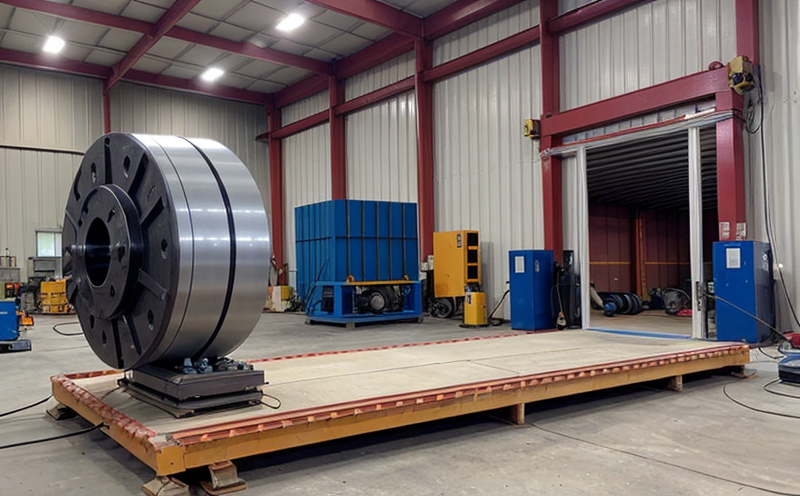ASTM D3580M Mechanical Shock Assessment
The ASTM D3580M standard provides a method for assessing the mechanical shock resistance of materials commonly used in building and infrastructure applications. This service is essential for quality managers, compliance officers, R&D engineers, and procurement teams who need to ensure that their products meet stringent performance requirements under dynamic loading conditions.
The ASTM D3580M test simulates real-world scenarios where materials may experience sudden impacts or shocks. It is particularly relevant in sectors such as construction, engineering, and manufacturing, where structural integrity and durability are critical factors. The test helps identify the material's ability to withstand rapid changes in stress without failing, which is crucial for ensuring product safety and longevity.
The mechanical shock assessment involves subjecting specimens to controlled impact forces using specialized equipment. The test setup typically includes a drop tower or a pendulum hammer that delivers the specified shock load to the sample. The specimen's response is monitored through various sensors, including accelerometers and strain gauges, to capture detailed data on stress distribution and deformation.
For accurate results, proper specimen preparation is critical. This involves selecting appropriate dimensions for the test samples based on the material type and expected loading conditions. Compliance with ASTM D3580M ensures that all specimens are prepared consistently, allowing for meaningful comparisons between different materials or batches of the same product.
The testing process itself relies on precise instrumentation to ensure reproducibility and reliability. The equipment used must meet strict calibration standards to guarantee accurate measurements. Additionally, software systems integrated with test machines provide real-time data processing capabilities, enabling immediate analysis and interpretation of results.
Once the tests are completed, detailed reports summarizing the findings are generated. These reports include not only raw data but also interpretations based on industry benchmarks established by ASTM D3580M. Compliance officers can use these reports to verify that their products meet regulatory requirements while R&D engineers can leverage them to refine designs and improve material selection.
The importance of mechanical shock assessment cannot be overstated, especially in environments characterized by frequent or extreme vibrations such as bridges, buildings, or machinery components. By adhering to ASTM D3580M guidelines, organizations demonstrate their commitment to producing high-quality products that can withstand harsh operating conditions without compromising safety.
In summary, ASTM D3580M mechanical shock assessment plays a vital role in ensuring product reliability and compliance with international standards. Its application across various industries underscores its significance as an indispensable tool for quality assurance professionals seeking to maintain the highest standards of performance.
Why It Matters
The ASTM D3580M mechanical shock assessment is critical in many applications where materials must endure sudden, severe impacts or vibrations. In building and infrastructure testing, this service ensures that structural components like beams, columns, and connectors can withstand unexpected loads without failure.
- Construction Safety: Ensuring that construction materials are capable of withstanding mechanical shocks helps prevent accidents during installation and use.
- Durability: By assessing how well a material performs under shock conditions, engineers can choose more durable materials for long-lasting structures.
- Regulatory Compliance: Meeting ASTM standards demonstrates adherence to international regulations governing product safety and performance.
- Product Reliability: Consistent testing according to ASTM D3580M ensures that products perform reliably under real-world conditions, enhancing customer satisfaction.
In essence, the ASTM D3580M mechanical shock assessment is not just a test—it's an investment in product integrity and safety. It helps organizations stay ahead of industry trends and meet evolving standards for quality assurance.
Applied Standards
The ASTM D3580M standard defines the procedure for conducting mechanical shock assessments on various materials commonly used in building and infrastructure applications. This method is widely recognized and utilized by industries that require high levels of performance from their materials under dynamic loading conditions.
The key aspects covered by ASTM D3580M include:
- Test Setup: Specification of the equipment required for delivering controlled impact forces to specimens.
- Specimen Preparation: Guidelines on how to prepare samples appropriately before testing.
- Data Collection: Methods for recording and analyzing data during and after the test.
- Acceptance Criteria: Standards defining what constitutes acceptable performance based on the collected data.
Compliance with ASTM D3580M ensures that tests are conducted consistently across different laboratories, fostering trust and reliability in testing results. This standardization is particularly important when comparing results from multiple sources or when seeking international recognition for test outcomes.
International Acceptance and Recognition
- ISO: ASTM D3580M aligns closely with ISO 16794-1, which specifies the procedure for assessing mechanical properties of metals. This alignment ensures compatibility between different standards.
- EN: The European Norm EN 12388 also references similar principles to ASTM D3580M in its guidelines for evaluating materials' resistance to impact loading.
- ASTM: As part of the ASTM family, ASTM D3580M is consistently updated to reflect advancements in testing technology and material science.
- IEC: While not directly referenced by ASTM D3580M, IEC standards often incorporate similar methodologies for assessing electronic components subjected to mechanical shocks.
The widespread adoption of ASTM D3580M across various countries underscores its importance in the global construction and manufacturing sectors. Laboratories accredited under these international standards are trusted globally due to their consistency and reliability.





